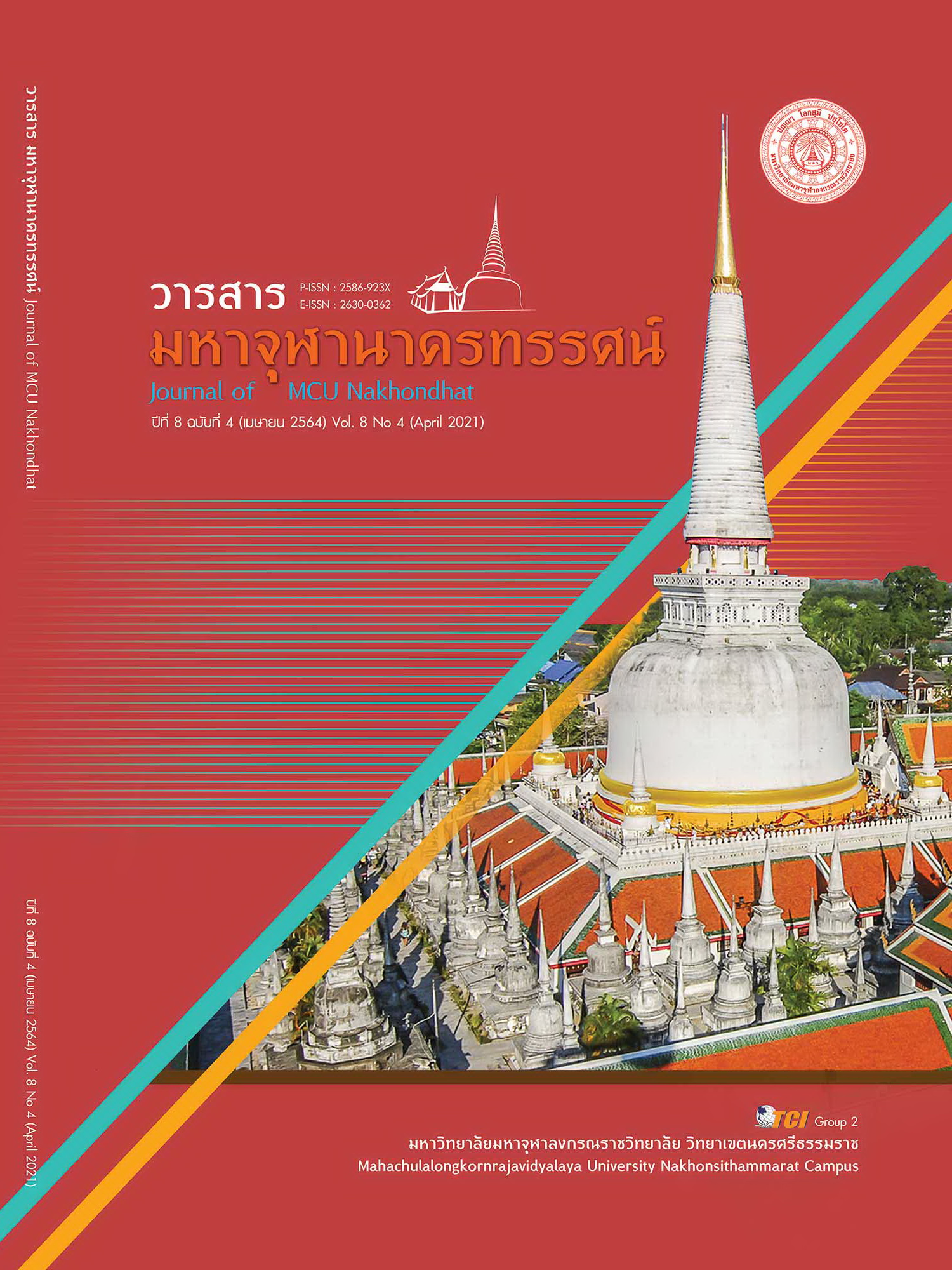MODERN LEADERSHIP AND ETHICAL STANDARD OF HIGHLY EFFECTIVE ADMINISTRATOR
Main Article Content
Abstract
This academic article. The author aims to study Leadership and ethical standards of modern management How is the high - effectiveness form (Paradigm). The results of the study show that modern leaders must have leadership. Both ethical standards, that is, vision, proactive leadership, conceptual thinking (Paradigm) to lead organizations to change And it is always dynamic. In order for an organization to be a leader to be highly effective, a leader must have leadership with seven characteristics: 1) Start proactive 2) Start with purpose in mind 3) Follow priorities 4) Think win - win 5) Understand others first So others understand us 6) Combine power to combine the difference and 7) Keep sharpening the saw. (Train yourself in all areas at all times) as for the ethical standards Bring an act the ethical standards of 2019 are based on the following principles: 1) adhere to the institution of the nation, religion and the monarchy and democratic government with the King as Head of State 2) honesty and good conscience and responsible for duties 3) Courage to make decisions and dare to do what is righteous 4) Thinking of common interests rather than personal interests. And have a public mind 5) focus on the achievement of work 6) perform duties fairly Does not discriminate and 7) maintain himself as a good example Maintain the image of the government as for other morality and ethics That do not violate ethical standards Can be adapted and used as an anchor for the mind and warned, such as the 10 official principles of King Rama VI (Rama 6), morality and ethics 4 and the ten tenants of His Majesty the King. Maha Bhumibol Adulyadej the Great (Rama 9) Royal writing.
Article Details
References
ไชยา ภาวะบุตร. (2554). ความเป็นนักบริหารมืออาชีพ. ใน เอกสารคำสอนรายวิชา 1065114. มหาวิทยาลัยราชภัฏสกลนคร.
ประสาน หอมพูล และทิพวรรณ หอมพูล. (2540). จิตวิทยาธุรกิจ. (พิมพ์ครั้งที่ 3). กรุงเทพมหานคร: สถาบันราชภัฎสวนดุสิต.
พระธรรมปิฎก (ป.อ.ปยุตฺโต). (2540). ธรรมนูญชีวิต. กรุงเทพมหานคร: โรงพิมพ์กรมการศาสนากระทรวงศึกษาธิการ.
พระบรมราโชวาทของ พระบาทสมเด็จพระเจ้าอยู่หัวพระปรมินทรมหาภูมิพลอดุลยเดช. (2549). คุณธรรม 4 ประการ. เรียกใช้เมื่อ 9 มกราคม 2564 จาก http://www.dhammathai.org/king-rama9/คุณธรรม-4-ประการ
พระราชบัญญัติมาตรฐานทางจริยธรรม. (2562). ราชกิจจานุเบกษา เล่มที่ 136 ตอนที่ 50 ก หน้าที่ 2 (16 เมษายน 2562).
พระราชบัญญัติระเบียบบริหารข้าราชการแผ่นดิน (ฉบับที่ 5). (2545). ราชกิจจานุเบกษา. เล่ม 119 ตอนที่ 99 ก หน้า 1 - 2 (2 ตุลาคม 2545).
เมาริก จอห์นแวน. (2549). คัมภีร์การพัฒนาภาวะผู้นำ แปลโดย ยุดา รักไทย และธนิกานต์ มาฆะศิรานนท์. กรุงเทพมหานคร: โรงพิมพ์อรรถมลการพิมพ์.
ระเบียบสำนักนายกรัฐมนตรีว่าด้วยการสร้างระบบบริหารกิจการบ้านเมืองและสังคมที่ดี. (2542). ราชกิจจานุเบกษา. เล่ม 116 ตอนที่ 63 ง หน้า 26 - 27 (10 สิงหาคม 2562).
รัฐธรรมนูญแห่งราชอาณาจักรไทย. (2540). ราชกิจจานุเบกษา. เล่ม 114 ตอนที่ ก หน้า 16 (11 ตุลาคม 2540).
. (2560). ราชกิจจานุเบกษา เล่มที่ 134 ตอนที่ 40 ก หน้าที่ 17 (6 เมษายน 2560).
ราชบัณฑิตยสถาน. (2546). พจนานุกรมฉบับราชบัณฑิตยสถาน พ.ศ. 2542. กรุงเทพมหานคร: โรงพิมพ์ศิริวัฒนาอินเตอร์ปริ้นท์.
ศิโรจน์ ผลพันธิน. (2548). ภาวะผู้นำกับการบริหารการเปลี่ยนแปลงเชิงรุกใหม่ ในท่ามกลางบริบทของโลกแห่งการเปลี่ยนแปลง. ใน เอกสารประกอบการบรรยาย. มหาวิทยาลัยราชภัฏสวนดุสิต.
สมยศ นาวีการ. (2539). การบริหาร. (พิมพ์ครั้งที่ 3). กรุงเทพมหานคร: โรงพิมพ์ดอกหญ้า.
สำนักงานคณะกรรมการข้าราชการพลเรือน. (2555). หนังสือ คู้มือการจัดทํามาตรฐานทางคุณธรรม และจริยธรรม. เรียกใช้เมื่อ 16 กุมภาพันธ์ 2561 จาก https://www.ocsc.go.th/node/4078
อานันท์ ปันยารชุน. (2548). ความหมายภาวะผู้นำ. จาก (On - line), Available. เรียกใช้เมื่อ 10 มกราคม 2564 จาก www.Suthep.ricr.ac.th/pd
เอกชัย กี่สุขพันธ์. (2538). การบริหารทักษะและการปฏิบัติ. กรุงเทพมหานคร: สุขภาพใจ.
Covey, S. R. (2549). คัมภีร์การพัฒนาภาวะผู้นำ แปลโดย ยุดา รักไทย และธนิกานต์ มาฆะศิรานนท์. กรุงเทพมหานคร: โรงพิมพ์อรรถมลการพิมพ์.
John, W. H. (1986). Managing People at Work. In A Manager’s Guide to Behavior in Organization. Burgh le Marsh,Lincolnshire. UK: 28 WestEd.
Northouse, P. G. (2001). Leadership Theory and Practice. (2nded). California: Sage Publications.


